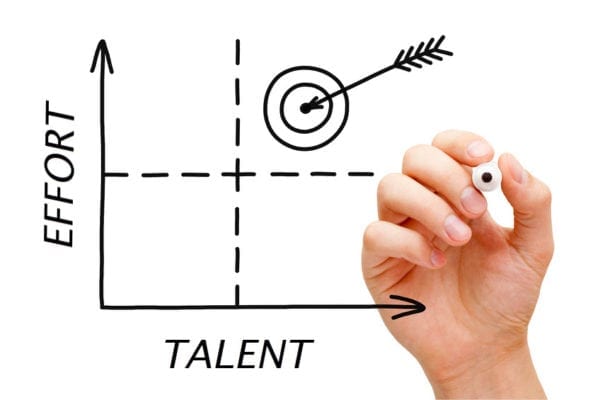If you believe that past performance is a good predictor of future success, think again.
Recent research has all but debunked the popular hiring model suggesting that success in the past can be replicated in the future based on innate talent (personality tests, cognitive abilities, education, and experience.)
If past performance is not a reliable indicator of future success, what is?

Management needs to start paying attention to mindset. According to Carol Dwerk, the “mother” of achievement goal theory, mindset is the key to talent prediction. I agree.
What separates top performers from mediocre ones may not be the raw talent they have but the effort they put into applying their abilities and skills. The formula for unlocking potential and achieving desired outcomes is:
Effort + Talent = Success.
Therefore understanding the sources of individual motivation that drives effort, and not innate talent, may be the key to peak performance.
That’s a bold statement coming from a guy whose living is based on selling pre-employment and leadership testing that is based on innate talent. So let me clarify.
Many people believe intelligence and personality is fixed from birth. You either have it…or you don’t. That is how many managers and consultants view talent. Some people have it. Others don’t. So why waste time on developing people who don’t. Why not just hire talent and let them do what they do best? Because too often “natural” talent lacks the motivation and resilience they need to do the work.
In this fixed mindset view of talent (where either you have it or you don’t), people are often consumed proving their intelligence or talent instead of developing it. They, like the employers who hire them, believe that talent alone creates success—without effort. They’re wrong.
High potential talent often believes that hard work makes them look weak. They carefully choose their career steps so that each foot lands safely. Their natural talent propels them up the ladder almost effortlessly…until the scope and scale of a challenge or problem stymies them. Trying harder – applying more effort – would be a sign of weakness. They deflect responsibility and accountability. To avoid self-doubt, they assign blame to others and unpredictable forces of nature.
Albert Bandura, the pioneer of self-efficacy, points out that individuals with a fixed mindset eventually tend to doubt themselves when challenged. Many high potentials who have the talent but experience a few setbacks begin to doubt themselves and even question those people who believe in their abilities. Those who lack the “natural” talent just give up.
But new advances in the study of human behavior suggest that our abilities aren’t fixed at all. Robert Sternberg, who is considered by many to be the guru on intelligence, believes that a major factor in whether people achieve expertise and unleash their full potential “is not some fixed prior ability, but “purposeful engagement.” That’s why it’s not always people who start out the smartest who end up the smartest…and it’s not always the people with the most talent who end up being the most successful.
For the fixed mindset, risk and effort are two things that might reveal inadequacies. Those with self-doubt don’t even try. People with fixed mindset quickly fear challenge and devalue effort. It is remarkable how many people with fixed mindset, especially if they believe they have the “gift” of natural talent, don’t believe in effort.
People designated as “star talent” often prefer to lie or make excuses over admitting a mistake or weakness. Saving face and protecting their image is paramount. In one study, 40 percent of participants with fixed mindset preferred lying about test results when asked to disclose negative scores in a test. Fixed mindset people don’t want to expose their deficiencies and inadequacies.
It seems to be that a growth mindset is what drives people step up to the challenge. People with this “get-better” attitude believe that their most basic abilities can be developed through dedication and hard work—brains and talent are just the starting point. This view creates a passion of learning and a resilience that is essential for great accomplishment. A growth mindset is what creates motivation and productivity in the world of business.
The passion, the will, and the ambition to stretch yourself and stick to something, even if it’s not going well, is the hallmark of the growth mindset.
When it comes to talent management and succession management, fixed mindset managers just look for natural talent; they judge their employees as competent or incompetent. Growth mindset managers identify potential and develop it. In today’s labor market shortfall of skilled workers, employers need to nurture and cultivate skills, not limit their pool. Identifying people with a growth mindset shows a lot of promise in an otherwise challenging market to fill open positions.
What are you doing today to identify employees who have a growth mindset?
Read more about how Talent + Effort = Hiring Success in The Name of the Game
